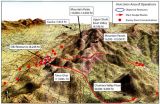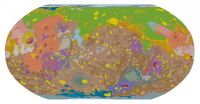(Press-News.org) Karl Klose, professor of biology and a researcher in UTSA's South Texas Center for Emerging Infectious Diseases, has teamed up with researchers at Ruhr University in Bochum, Germany to understand how humans get infected with cholera, Their findings were released this week in an article published by the Proceedings of the National Academy of Sciences.
Cholera is an acute infection caused by ingestion of food or water that is contaminated with the bacterium Vibrio cholerae. An estimated three to five million cases are reported annually and 100,000-120,000 people die from cholera infections every year. Cholera patients suffer from dramatic fluid loss and can lose up to 40 liters of fluid from their body in just a few days.
Klose and his collaborators discovered that Vibrio cholerae, which normally lives in oceans and rivers, senses a shift in temperature as it enters the human body through a mechanism called a Ribonucleic Acid (RNA) thermometer. The thermometer detects the higher body temperature of 98.6 degrees Fahrenheit, and then turns on the virulence factors that lead to cholera. Klose's laboratory showed that interfering with the thermometer prevents the bacteria from causing disease, suggesting possible therapeutic outcomes from this research.
The research collaboration stemmed from a long friendship between Klose and Franz Narberhaus, who trained as microbiologists together at U.C. Berkeley 25 years ago.
"The temperature shift is one of the signals that the bacterium uses to turn on the virulence factors, such as the cholera toxin, that cause the disease," said Klose. "We have shown that the bacteria's thermometer controls temperature-dependent expression of the virulence factors. They only express them when they are at body temperature and not at ocean temperature."
"We found that if the RNA thermometer is prevented from working correctly and detecting the right temperature, the bacteria won't cause any disease at all. The organisms will just pass right through the body," explained Klose. "If you can figure out how to disrupt the RNA thermometer in some manner, then you may have a therapy against this disease."
Klose says the long-term goal is to come up with intervention strategies against cholera. Understanding exactly how the bacterium controls the expression of the virulence factors is one step forward in trying to intervene during cholera epidemics.
INFORMATION:
Connect online with UTSA on Facebook, Twitter, Youtube and LinkedIn.
About UTSA
The University of Texas at San Antonio (UTSA) is an emerging Tier One research institution specializing in health, energy, security, sustainability, and human and social development. With nearly 29,000 students, it is the largest university in the San Antonio metropolitan region. UTSA advances knowledge through research and discovery, teaching and learning, community engagement and public service. The university embraces multicultural traditions and serves as a center for intellectual and creative resources as well as a catalyst for socioeconomic development and the commercialization of intellectual property – for Texas, the nation and the world.
UTSA microbiologists discover regulatory thermometer that controls cholera
Findings published in Proceedings of the National Academy of Sciences
2014-09-23
ELSE PRESS RELEASES FROM THIS DATE:
'Space bubbles' may have aided enemy in fatal Afghan battle
2014-09-23
WASHINGTON, DC—In the early morning hours of March 4, 2002, military officers in Bagram, Afghanistan desperately radioed a Chinook helicopter headed for the snowcapped peak of Takur Ghar. On board were 21 men, deployed to rescue a team of Navy SEALS pinned down on the ridge dividing the Upper and Lower Shahikot valley. The message was urgent: Do not land on the peak. The mountaintop was under enemy control.
The rescue team never got the message. Just after daybreak, the Chinook crash-landed on the peak under heavy enemy fire and three men were killed in the ensuing firefight.
A ...
This week from AGU: New geologic map of Mars, storm surge in Florida
2014-09-23
From this week's Eos: The New Geologic Map of Mars: Guiding Research and Education
Currently, five spacecraft are investigating Mars, and a swarm of new missions to the Red Planet either have been launched or are in development. They are designed to probe the surface, subsurface, and atmosphere with a host of scientific instruments. Where will they make new discoveries? Clues to where they should focus investigations can be gleaned from the planet's new geologic map.
From AGU's journals: History of storm surge in Florida strongly underestimated
The observational ...
Water-quality trading can reduce river pollution
2014-09-23
DURHAM, N.C. -- Allowing polluters to buy, sell or trade water-quality credits could significantly reduce pollution in river basins and estuaries faster and at lower cost than requiring the facilities to meet compliance costs on their own, a new Duke University-led study finds.
The scale and type of the trading programs, though critical, may matter less than just getting them started.
"Our analysis shows that water-quality trading of any kind can significantly lower the costs of achieving Clean Water Act goals," said Martin W. Doyle, professor of river science and policy ...
State policies are effective in reducing power plant emissions, CU-led study finds
2014-09-23
A new study led by the University of Colorado Boulder found that different strategies used by states to reduce power plant emissions -- direct ones such as emission caps and indirect ones like encouraging renewable energy -- are both effective. The study is the first analysis of its kind.
The findings are important because the success of the Environmental Protection Agency's proposed Clean Power Plan depends on the effectiveness of states' policies in reducing power plants' carbon dioxide emissions. The plan would require each state to cut CO2 pollution from power plants ...
Big changes in the Sargasso Sea
2014-09-23
Over one thousand miles wide and three thousand miles long, the Sargasso Sea occupies almost two thirds of the North Atlantic Ocean. Within the sea, circling ocean currents accumulate mats of Sargassum seaweed that shelter a surprising variety of fishes, snails, crabs, and other small animals. A recent paper by MBARI researcher Crissy Huffard and others shows that in 2011 and 2012 this animal community was much less diverse than it was in the early 1970s, when the last detailed studies were completed in this region.
This study was based on field research led by MBARI ...
Study finds gallbladder surgery can wait
2014-09-23
LOS ANGELES – (September 23, 2014) –Laparoscopic cholecystectomy, a minimally invasive procedure to remove the gallbladder, is one of the most common abdominal surgeries in the U.S. Yet medical centers around the country vary in their approaches to the procedure with some moving patients quickly into surgery while others wait.
In a study published online Monday in the American Journal of Surgery, researchers found gallbladder removal surgery can wait until regular working hours rather than rushing the patients into the operating room at night.
"The urgency of removing ...
'Bendy' LEDs
2014-09-23
VIDEO:
This is an animation of the micro-rod growth process.
Click here for more information.
WASHINGTON D.C., Sept. 23, 2014 -- "Bendy" light-emitting diode (LED) displays and solar cells crafted with inorganic compound semiconductor micro-rods are moving one step closer to reality, thanks to graphene and the work of a team of researchers in Korea.
Currently, most flexible electronics and optoelectronics devices are fabricated using organic materials. But inorganic compound ...
Diabetes: Complexity lost
2014-09-23
WASHINGTON, D.C., September 23, 2014 -- For millions of people in the United States living with Type 1 or Type 2 diabetes, measuring the daily rise and fall of blood glucose (sugar) is a way of life.
Our body's energy is primarily governed by glucose in the blood, and blood sugar itself is exquisitely controlled by a complicated set of network interactions involving cells, tissues, organs and hormones that have evolved to keep the glucose on a relatively even keel, pumping it up when it falls too low or knocking it down when it goes too high. This natural dynamical balance ...
Future flexible electronics based on carbon nanotubes
2014-09-23
WASHINGTON, D.C., September 23, 2014—Researchers from the University of Texas at Austin and Northwestern University have demonstrated a new method to improve the reliability and performance of transistors and circuits based on carbon nanotubes (CNT), a semiconductor material that has long been considered by scientists as one of the most promising successors to silicon for smaller, faster and cheaper electronic devices. The result appears in a new paper published in the journal Applied Physics Letters, from AIP Publishing.
In the paper, researchers examined the effect ...
Lack of sleep increases risk of failure in school
2014-09-23
A new Swedish study shows that adolescents who suffer from sleep disturbance or habitual short sleep duration are less likely to succeed academically compared to those who enjoy a good night's sleep. The results have recently been published in the journal Sleep Medicine.
In a new study involving more than 20,000 adolescents aged between 12 and 19 from Uppsala County, researchers from Uppsala University demonstrate that reports of sleep disturbance and habitual short sleep duration (less than 7 hours per day) increased the risk of failure in school.
The study was led ...
LAST 30 PRESS RELEASES:
Kennesaw State's Vijay Anand honored as National Academy of Inventors Senior Member
Recovery from whaling reveals the role of age in Humpback reproduction
Can the canny tick help prevent disease like MS and cancer?
Newcomer children show lower rates of emergency department use for non‑urgent conditions, study finds
Cognitive and neuropsychiatric function in former American football players
From trash to climate tech: rubber gloves find new life as carbon capturers materials
A step towards needed treatments for hantaviruses in new molecular map
Boys are more motivated, while girls are more compassionate?
Study identifies opposing roles for IL6 and IL6R in long-term mortality
AI accurately spots medical disorder from privacy-conscious hand images
Transient Pauli blocking for broadband ultrafast optical switching
Political polarization can spur CO2 emissions, stymie climate action
Researchers develop new strategy for improving inverted perovskite solar cells
Yes! The role of YAP and CTGF as potential therapeutic targets for preventing severe liver disease
Pancreatic cancer may begin hiding from the immune system earlier than we thought
Robotic wing inspired by nature delivers leap in underwater stability
A clinical reveals that aniridia causes a progressive loss of corneal sensitivity
Fossil amber reveals the secret lives of Cretaceous ants
Predicting extreme rainfall through novel spatial modeling
The Lancet: First-ever in-utero stem cell therapy for fetal spina bifida repair is safe, study finds
Nanoplastics can interact with Salmonella to affect food safety, study shows
Eric Moore, M.D., elected to Mayo Clinic Board of Trustees
NYU named “research powerhouse” in new analysis
New polymer materials may offer breakthrough solution for hard-to-remove PFAS in water
Biochar can either curb or boost greenhouse gas emissions depending on soil conditions, new study finds
Nanobiochar emerges as a next generation solution for cleaner water, healthier soils, and resilient ecosystems
Study finds more parents saying ‘No’ to vitamin K, putting babies’ brains at risk
Scientists develop new gut health measure that tracks disease
Rice gene discovery could cut fertiliser use while protecting yields
Jumping ‘DNA parasites’ linked to early stages of tumour formation
[Press-News.org] UTSA microbiologists discover regulatory thermometer that controls choleraFindings published in Proceedings of the National Academy of Sciences






